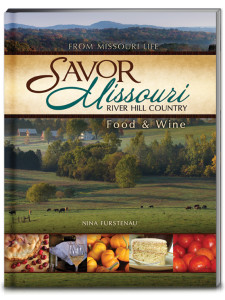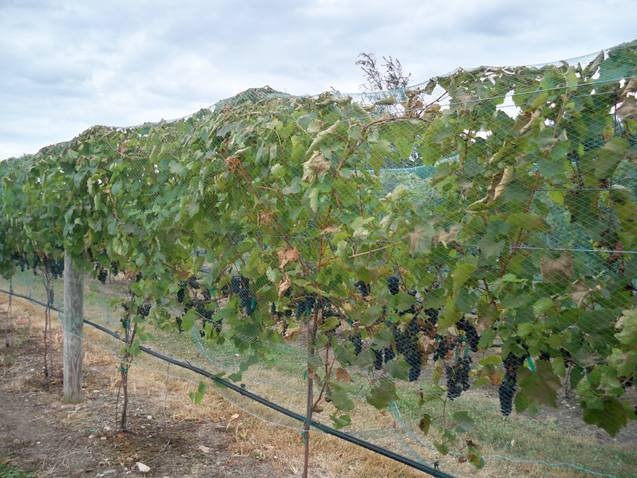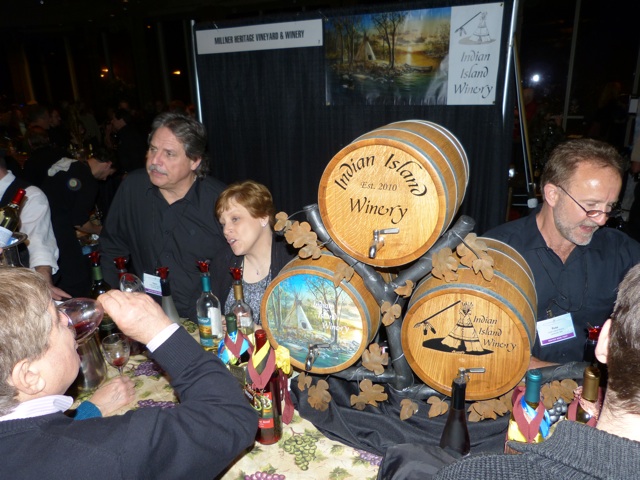New Guide to Missouri Agritourism
 One aspect of print media that will never go out of style is the travel guide. A hard copy travel guide is not only useful for planning a trip, it can also be marked up and taken with on vacation. When you get back home, the tour guide becomes a dog eared souvenir full of notes and various papers collected along the way.
One aspect of print media that will never go out of style is the travel guide. A hard copy travel guide is not only useful for planning a trip, it can also be marked up and taken with on vacation. When you get back home, the tour guide becomes a dog eared souvenir full of notes and various papers collected along the way.
Nina Furstenau’s Savor Missouri River Hill Country, is a travel guide for tourists in search of a true “local” experience. While some the 72 destinations in the book are well-known, many are obscure gems that only someone intimately familiar with the area would know.
For example, Connie Cunningham in Morrison raises German Embden and French Toulouse geese and is opening a bed and breakfast during 2013. And did you know that Bias Winery in Berger is the second winery-microbrewery combination in the U.S.?
This book is full of details for the serious agritourist and local wine enthusiast. Many Missouri wineries serve Norton, Vignoles and maybe one or two other wines, but Bias Winery makes wine from unusual estate grown grapes like Fredonia and DeChaunac as well as Catawba and Seyval. Vinifera varietals are notoriously hard to grow in Missouri, but Savor Missouri explains that River Ridge Winery in Commerce makes estate grown Merlot, Syrah and Chardonnay.
According to Furstenau’s book, Hemman Winery in Brazeau even makes a “cushaw” wine, whatever that is.
The premise behind “Savor Missouri” is the existence of a rural food and wine based cultural area along a 230 mile stretch of the Mississippi River extending from Hannibal to just past Cape Girardeau. This region, which the author calls “River Hill Country,” also includes the popular tourist destinations, like Hermann, that line the Missouri River west of St. Louis.
If culture is defined as a blend of art, commerce and history that creates its own personality, Furstenau makes a good case that River Hill Country qualifies as a cultural destination. Culture in this part of Missouri includes wine, beer, distilled spirits and a surprisingly diverse range of food producers including Baetje Farms in Bloomsdale which has won international awards for goat cheese.
Furstenau, a teacher at the University of Missouri Science and Agricultural Journalism Program in Columbia, knows that every good story includes interesting characters. And there are no shortage of colorful characters in this book. High quality color photos of every business owner profiled helps convey the spirit of entrepreneurism and the work ethic that defines this part of Missouri. You can almost see the passion in the eyes of winery owners, like Chuck Dressel of Mount Pleasant Winery, whose livelihood depends on the health of 60,000 grape vines.

Cave Vineyard, where you can drink wine in a real cave, is just one of the distinctive wineries in Missouri River Hill Country.
What impressed me most about the artisan producers profiled in Savor Missouri is how long and how hard they have worked to perfect their craft:
- Peter Hofherr, the owner of St. James Winery, Missouri’s largest, started in the winery at age nine carrying cases of wine for customers. “The better jokes I had, the better tips I got,” he jokes in the book.
- Ed Woods of Woods Smoked Meats in Hermann, “has been interested in meats since he was 12 years old.” Ed is now in the Meat Processors Cured Meats Hall of Fame and he travelled to Turkmenistan in 1995 to help set up a sausage shop.
- The land on which Overland Farm in Clarksville currently operates was given to owner Nathalie Pettus’ great-great grandfather by the King of Spain. One interesting aspect of Southeast Missouri history is that the area was settled one hundred years before the rest of the Midwest.
- Missouri wineries are some of the oldest in the Midwest and the families who run them are profiles in determination. Thomas Held of Stone Hill Winery (established in 1847) “started slipping little plastic seals on wine bottles” when he was two-and-one-half-years old.
- Paul Le Roy, winemaker for Hermannof Winery in Hermann, started at the Winery as cellar hand when he was in high school. Thirty one years later, “he still values elbow grease and timing,” qualities the builders of the 161 year old wine caves at Hermanoff would certainly appreciate if they were alive today.
- Tim Puchta is the sixth generation of his family to work at Adam Puchta Winery in Hermann, the oldest family owned winery in the United States.
Savor Missouri makes a persuasive case that the unique businesses and colorful proprietors make this part of Missouri a unique travel destination that is worth a long weekend.
One indication that River Hills County is an authentic agritourism region is that some of the restaurants featured in the book do carry local wines. According to Sybill Scheffer at Sybill’s in St. James, her restaurant does carry wines from local wineries including Peaceful Bend Winery, Wenwood Farms and White Mule. However, James Allen with Celebrations Restaurant in Cape Girardeau said the wineries in his immediate area sell all the wine they produce in their tasting rooms and therefore don’t appear on his wine list.
If you want to see more local wines on restaurant wine lists when you travel, it’s important to let your server or the restaurant owner know that your prefer local wine with local food. It’s also important to have a good tour book like Savor Missouri so you don’t waste time visiting places that are not truly part of the local culture.




1 Response
[…] http://midwestwinepress.com/2013/05/19/savor-missouri-travel-guide/ […]